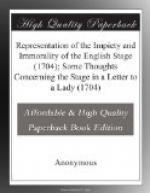And now may not these plain Questions be proposed, without Offence, to the Persons who frequent our Play-Houses_; and especially to such of them as appear at any times in our Churches, and at the Holy Sacrament, and be submitted to the Judgment of all Mankind._
I. Can Persons who frequent the Play-Houses, and are not displeased to hear Almighty God blasphemed, his Providence questioned and denied, his Name prophaned, his Attributes ascribed to sinful Creatures, and even to Heathen Gods, his Holy Word burlesqued, and treated as a Fable, his Grace made a Jest of, his Ministers despised, Conscience laught at, and Religion ridiculed; in short, the Christian Faith and Doctrine exposed, and the sincere Practice of Religion represented as the Effect of Vapours and Melancholy, Virtue discountenanced, and Vice encouraged. Evil treated as Good, and Good as Evil, and all this highly aggravated by being done in cool Blood, upon Choice and Deliberation? Can those, I say, that frequent the Play-Houses, and are not displeased with any of these things, be thought to have any due Sense of Religion?
II. Can Persons who often spend their Time and Money to see Plays, be suppos’d to be displeas’d with, and to have a due Indignation at, the Hearing the Outrages beforementioned, which so often occur in them, and of which there is a dismal Specimen laid before the World in this Paper?
III. Can sincere Christians encourage and assist, by their Presence and Purses, Men in committing such Practices, and in their living by a Profession, which, as it is managed, is so inconsistent with Christianity?
IV. Can any who have a true Concern for the Honour of Almighty God, give Countenance and Support to such Entertainments whereby he is so dishonour’d and affronted, though they could suppose themselves above the Danger of being the worse for them, which they can never be?
V. Can Persons who know ’tis generally allowed, that the Infidelity and Looseness of the Age is very much owing to the Play-Houses; who have observed, that the Zeal of particular Persons have decreased, and their Strictness of Life abated, by their going to Plays; and do think that the Gospel obliges them to discourage, by their Reproof and Example, Sin in their Neighbours, to endeavour, according to their Advantages and Opportunities, to further their spiritual Welfare, and to be Lights to lead others in their Duty and Way to Heaven? Can such, tho’ they could think themselves wholly secure from taking Infection in going to the Play-House, encourage others, even weak and feeble Christians, by their Example, to run to the same dangerous Place likewise? Can this be thought an Expression of their Charity to their Neighbour, or to be acceptable to Almighty God? or rather, Should not Compassion to the Souls of their Neighbours keep such as have a due Concern for them from going to such Places?
VI. Can it be denied, but that the going of a few sober Persons, tho’ but once a Year, to see a Play, that they think less offensive and dangerous, does encourage many others to go frequently to Plays, and to those that are more abominably loose and prophane; who might never go at all to them, if none frequented them but such as were entirely abandoned to Shame as well as Vice?




